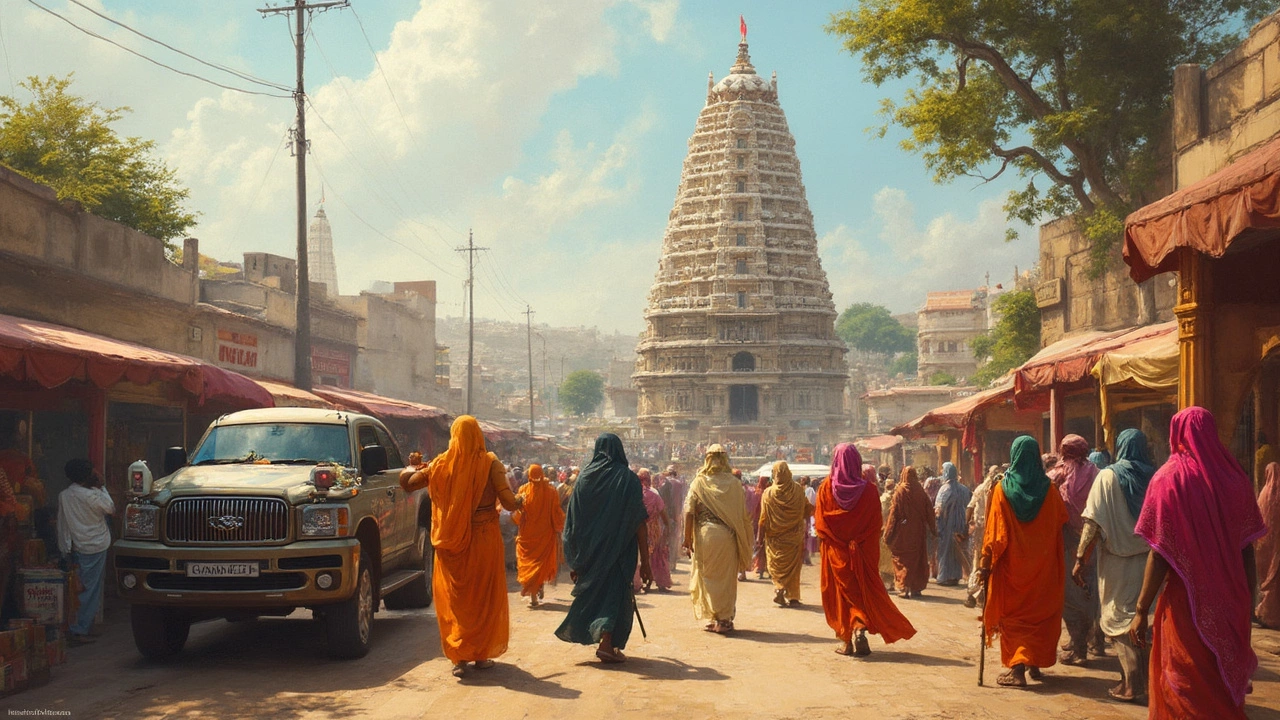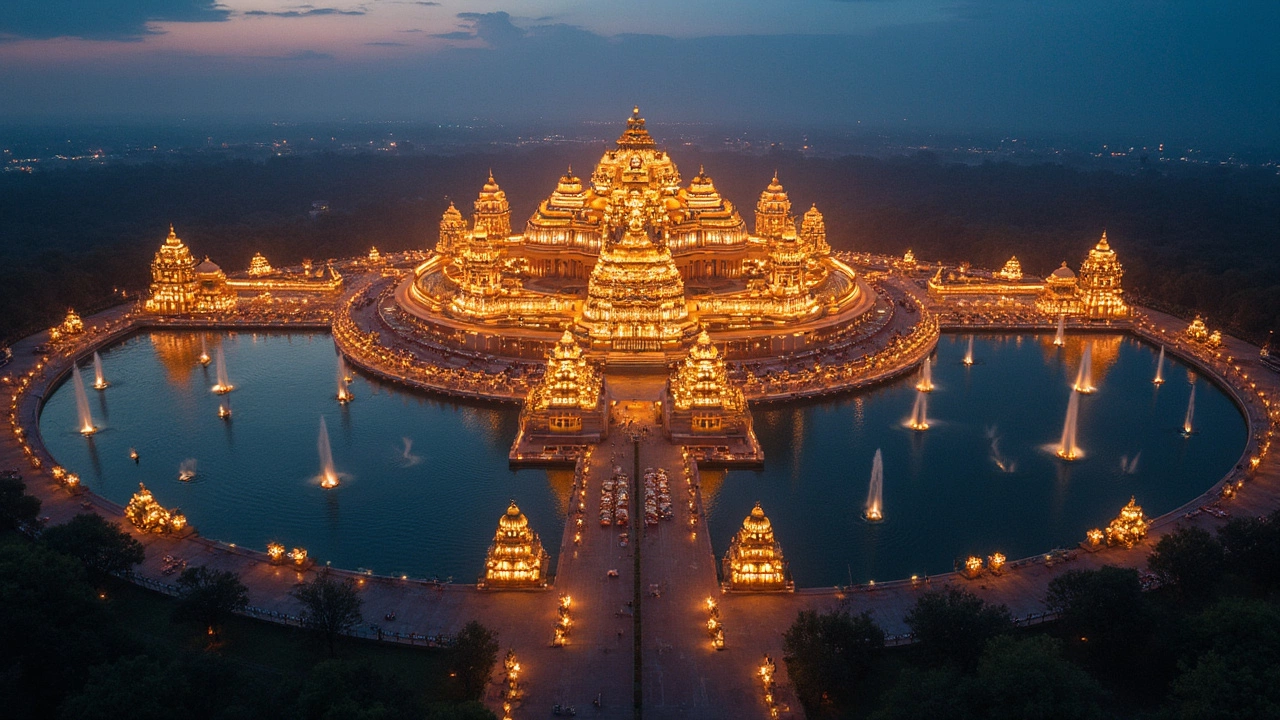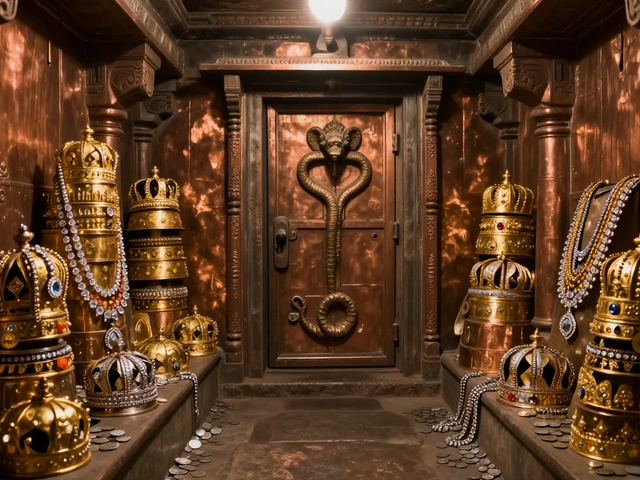India, with its vibrant tapestry of religions, holds some of the world's wealthiest faiths within its borders. But have you ever wondered which stands above the rest in terms of wealth? It's fascinating how belief systems, temples, and communities amass wealth, contributing significantly to the culture and economy.
So, which religion is considered the richest in India? Drumroll, please... It's Hinduism! With thousands of temples scattered across the country, many are bulging with wealth. Intricately carved structures, silver-lined altars, and eye-popping hoards of donated gold are just the tip of the iceberg. Let's get into why temple riches go beyond opulence and the surprising ways this wealth impacts society.
- Introduction to India's Religious Wealth
- The Wealthiest Religion
- Key Temples to Visit
- How Religion and Wealth Interconnect
- Tips for Temple Tours
Introduction to India's Religious Wealth
India's religions are not just about spirituality; they're tightly interwoven with grandeur and economic significance. Among them, Hinduism reigns supreme in terms of wealth. Towering temples, some centuries old, serve both as spiritual havens and financial powerhouses. Their vast riches come from a variety of sources, contributing to the economy and supporting numerous charitable activities.
These temples are major recipients of donations, pulling in vast amounts of cash, gold, and jewels. For instance, the Tirumala Venkateswara Temple in Andhra Pradesh, often regarded as the wealthiest in India, accumulates donations averaging 650 crore rupees annually. Pilgrims contribute generously, driven by faith, gratitude, and sometimes hopes for blessings.
Temples: More Than Just Places of Worship
The wealth generated isn't just hoarded. Many temples run educational institutions, hospitals, and various socio-economic programs. They employ scores of individuals, creating local jobs and boosting regional economies. So, when we talk about the richest religion in India, it extends beyond just vaults of gold and sprawling estates—it touches countless lives.
Next time you embark on temple tours in India, remember it's not just about spirituality or history. You're witnessing a pivotal element of the Indian economy that's part of a larger narrative intertwining faith and finance.
The Wealthiest Religion
In India, when it comes to divine wealth, Hinduism takes the crown. The staggering riches of its temples have made headlines across the globe. But how exactly did these temples acquire so much wealth?
Let's start with some jaw-dropping facts. Temples like the Sri Venkateswara Temple in Tirupati are prime examples of opulence. This temple reportedly receives donations averaging around 22 tonnes of gold per year! Yes, you read that right. People from all over the world donate generously, contributing to the temple's financial pool.
Top Gold Hoarding Temples
Some other temples aren't far behind in terms of riches:
- Padmanabhaswamy Temple in Kerala: It got global attention when hidden cellars revealed gold and jewels valued at billions of dollars.
- Shirdi Sai Baba Temple: Known not just for its wealth but also for the influx of donations in cash and kind from devotees globally.
- Vaishno Devi Temple: Nestled in the foothills of the Himalayas, it's famous for millions of pilgrims who visit, offering wealth and contributing to its prosperity.
The legacy of wealth flows from historical patronage by kings, steady donations by devotees, and management of properties owned by the temples. These temples don't just pile up wealth; they actively engage in running schools, hospitals, and annadanams (free meals).
How Wealth Influences Society
The wealth managed by these religious institutions plays a HUGE role in surrounding communities. For example, temple-run educational institutions provide schooling to underprivileged children. The temples also invest in conservation projects, helping preserve cultural heritage.
Despite its influence, this immense wealth sparks debates over financial transparency and allocation. There are ongoing discussions about how income should be more effectively utilized for societal benefit.
| Temple Name | Location | Annual Gold Donations (approx.) |
|---|---|---|
| Sri Venkateswara Temple | Tirupati | 22 tonnes |
| Padmanabhaswamy Temple | Kerala | Billions (estimated value in jewelry) |
| Shirdi Sai Baba Temple | Shirdi | Significant cash and gold (exact figures vary) |

Key Temples to Visit
Ready to explore some of the most jaw-droppingly wealthy temples in India? These places aren't just spiritual havens but also treasure troves, attracting visitors from across the globe. Here are a few you absolutely can't miss:
Tirupati Balaji Temple, Andhra Pradesh
Believed to be the richest Hindu temple, Tirupati Balaji is a marvel in its own right. The sheer volume of donations this temple receives is mind-blowing. Devotees offer gold, money, and even their hair as a mark of devotion. Rumor has it, the temple's daily earnings surpass what many large companies make!
Padmanabhaswamy Temple, Kerala
If we're talking about sheer wealth, Padmanabhaswamy Temple might just top the list. Known for its secret vaults filled with gold, silver, and precious stones, this temple shot to fame when one of its hidden chambers was opened and mind-boggling treasures were discovered. Yet another chamber remains unopened, adding to the air of mystery.
Shirdi Sai Baba Temple, Maharashtra
Visiting the Shirdi Sai Baba Temple is about more than just gazing at its wealth. Although its donations rival those of other major temples, the focus here is on the lessons of Sai Baba. People from various faiths come here, making it one of the most visited and beloved sites in India.
Vaishno Devi Temple, Jammu and Kashmir
High up in the Trikuta Mountains, Vaishno Devi draws millions every year. The temple's wealth stems from both direct donations and the booming business of its surrounding pilgrim economy. Yet, no amount of money overshadows the sheer spiritual upliftment many claim to feel here.
Exploring these temples isn't just about their riches. It's about the humbling experiences, the architectural beauty, and the history they offer. Whether you're on a temple tour in India or simply curious about their stories, these temples are a must-visit.
How Religion and Wealth Interconnect
Religion and wealth go hand in hand in fascinating ways, especially in India where religious wealth is a huge factor in cultural and social life. This isn't just about money; it's about how beliefs fuel economies and why faith-based communities flourish financially.
Devotees and Donations
Here's the scoop: temples often receive generous donations from devotees. We're talking everything from small coins to large gold jewelry. This philanthropic practice is deeply rooted in the belief that giving back to the gods can lead to greater spiritual returns. It's like a divine investment program!
Temple Treasures
Some temples, such as the Padmanabhaswamy Temple, hold treasure troves worth billions. Discovered only a decade ago, these treasures include gold chains, coins, and even vintage artifacts. The wealth held by some temples isn't just astounding—it's practically legendary.
| Temple | Estimated Wealth (INR) |
|---|---|
| Padmanabhaswamy | 1.2 Trillion |
| Tirupati Balaji | 500 Billion |
Economic Influence
Beyond just hoarding wealth, temples play a significant role in local economies. They provide jobs, attract tourism, and even engage in charitable activities like building hospitals and schools. It's this kind of influence that keeps the relationship between religion and the economy so intertwined.
Ever considered why some religious holidays see bustling market scenes? It's the economic boost from added foot traffic to these rich temples. Faith isn’t just a personal thing; it’s a key economic driver.

Tips for Temple Tours
Exploring temples on your Indian adventure? That's fantastic! These sacred sites offer a glimpse into the spiritual and cultural essence of the country. But before you lace up your sneakers, here's what you need to keep in mind to make the most of your visit.
Respect the Dress Code
First things first, dress modestly. Most temples have a conservative dress code, meaning shoulders and knees should be covered. Slip-on shoes work best, since you'll need to leave them at the door.
Timing is Everything
Want to avoid the rush? Hit up the temples early in the morning. Not only will you beat the crowds, but you'll also dodge the punishing midday heat. Look out for special festivals, too. They're vibrant but usually packed!
Photography Policies
Be aware of the photography rules. Some temples allow photos in certain areas, but others are strictly a no-snap zone for religious reasons. When in doubt, ask!
Giving Donations
Temple tours India often include stops at well-endowed religious sites, where giving a donation is customary. Even small amounts add up and contribute to maintenance and charitable activities. Be respectful and consider contributing to the upkeep of these spiritual havens.
Guided Tours
If you're really eager to dive deep, hire a guide. They can offer insights and tell fascinating stories that you won't find in guidebooks. Plus, they help navigate the do's and don'ts, making for a smoother experience.
Local Customs
A temple tour isn't just about the architecture and riches. Immerse yourself by understanding local customs. Participate in rituals, savor the prasad (sacred food), and don't hesitate to chat with locals. You never know what fascinating stories they might share.
Keep these tips in mind, and you'll have a fulfilling and respectful temple tour experience, no matter which part of India you're exploring!





